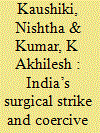| Srl | Item |
| 1 |
ID:
148106


|
|
|
|
|
| Summary/Abstract |
India had been virtually driven to the wall in the wake of yet another terrorist attack on Indian army base in Uri. It has revived the memories of the Kaluchak and Pathankot attacks, and, 26/11. As India was caught unaware, it was probably believed by the government in power that an absolute majority in the Parliament and, after a stern warning after the Pathankot attack, Pakistan would probably not attempt any other mischief. While addressing a rally in Kerala, Prime Minister Narendra Modi stated that India will neither forget nor forgive the enormity of the Uri attack. This was also further followed by External Affairs Minister Sushma Swaraj’s evocative speech at the United Nations General Assembly (UNGA). However, the surgical strikes were unexpected given the policy of strategic restraint that India had followed in the past and indeed it was a resolute decision.
|
|
|
|
|
|
|
|
|
|
|
|
|
|
|
|
| 2 |
ID:
151132


|
|
|
|
|
| Summary/Abstract |
This paper would focus on twenty-first century maritime silk route poser in between China and India. Beijing as a rising economic super power in the world is pronounced as a complicated feature of the Twenty-first century. The economic rise of China put pressure on Beijing’s leadership to secure its economic growth and hegemonic power position in the region. Therefore, Beijing strategically gear up its military modernisation and weapon procurement policy. The main focus is on naval development and regional connectivity through the newly initiated Silk Road and twentyfirst century maritime silk route projects, which makes big powers like US, Japan, and India suspicious about the intention of China.
|
|
|
|
|
|
|
|
|
|
|
|
|
|
|
|